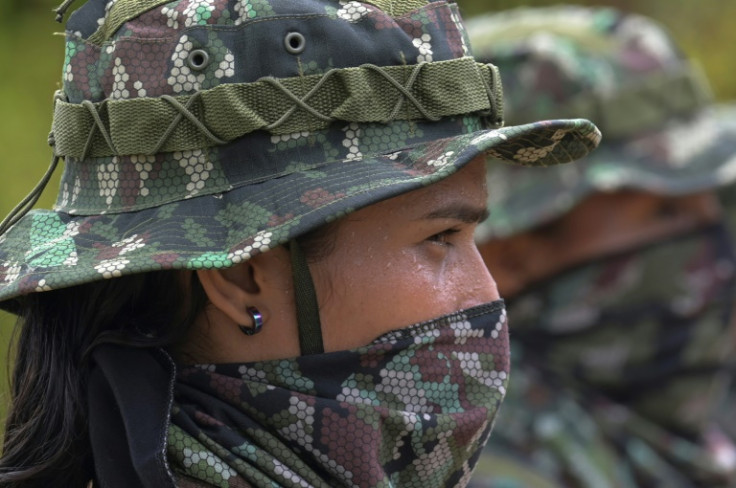Colombia Rebels Say Peace Talks 'Blocked' Over Warrants For Leaders

One of Colombia's biggest left-wing guerrilla groups says peace talks are "blocked" over the government's failure to cancel warrants for the arrest of its leaders.
"The process is blocked, it's not moving forward," Walter Mendoza, chief negotiator for the FARC dissident group Segunda Marquetalia told AFP in an exclusive interview in a coca-growing region in the southwestern Narino department.
Segunda Marquetalia is the second-biggest of two main groups that broke away from the FARC guerilla army after it signed a historic peace deal in 2016.
In June, President Gustavo Petro's government began talks with the rebels whose leader Ivan Marquez helped broker the 2016 agreement only to sour on it three years later and take up arms again.
"They deceived us," Mendoza, the rebels' second-in-command, said in the group's first interview with AFP, adding that Segunda Marquetalia's members still had "the will to fight."
The 2016 peace deal with FARC was hailed as a turning point in the six-decade-long conflict between Colombian security forces, guerrillas, right-wing paramilitaries and drug gangs.
But dissident factions, led by the Central General Staff (EMC) -- a bigger rival of Segunda Marquetalia -- continue to hold sway in several parts of the country, particularly in the south and southwest.
Colombia's first-ever leftist president, Petro vowed on his election in mid-2022 to end the violence through dialogue.
On his watch, the state has entered into talks with at least eight armed groups.
Segunda Marquetalia, which is estimated by Colombia's intelligence services to number around 1,600 rebels, began talks with the government in neighboring Venezuela in June and soon after announced a ceasefire.
Speaking in the southwestern town of Llorente, in a region dotted with coca fields and cocaine-making laboratories, Mendoza said the group was still "fully committed" to the peace process.
The "main problem," he said, was that the government had not yet cancelled arrest warrants for three of its leaders, including Marquez.
"Our repeated requests have gone unanswered," he said.
Rights groups accuse guerrillas in Colombia of taking advantage of various ceasefires to expand their influence by seizing more territory and recruiting new members.
Both EMC and Segunda Marquetalia are accused of gross human rights abuses, including assassinations and kidnapping, as well as of large-scale drug trafficking.
"We are not drug traffickers. We are a political and military organization," Mendoza insisted.
He admitted the group levied a "tax" on drug trafficking in areas under its control but insisted: "We don't tax the coca farmers."
The government and rebels had agreed to hold a second round of peace talks on July 20 in western Colombia focused on de-escalation and social and economic upliftment projects for rural areas.
But the talks were later called off.
Marquez blamed the government, saying it did not inform the guerrillas how to arrange safe passage to the talks for its negotiators.
The government launched talks with EMC in October 2023, but the group split in April and half of its fighters abandoned the peace process.
Bogota is also in stop-start talks with the Marxist National Liberation Army (ELN) -- responsible for the kidnapping last October of the father of a Liverpool footballer, Luis Diaz.

© Copyright AFP 2024. All rights reserved.





















